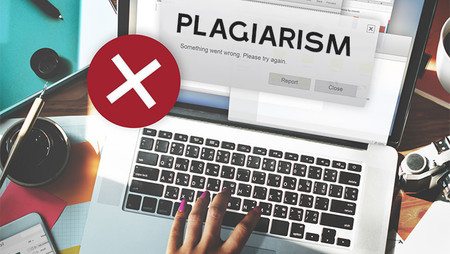Plagiarism is when someone wrongfully appropriates and steals another author’s “language, thoughts, ideas or expressions” and then presents them as one’s own original work. It is “considered academic dishonesty and a breach of journalistic ethics.”
There are no criminal laws against it. However, in academia and the workplace, it is considered a serious ethical offence. Some cases can even “constitute copyright infringement.” (Source: Wikipedia) Even if you have plagiarised unintentionally, such behaviour can negatively impact your professional career. This article will discuss this issue as well as provide online resources on how to defend against unintentional plagiarism.
Understand what it is
Many people incorrectly think that the only way to plagiarise is to directly copy and paste someone else's work and claim it as your own. But, paraphrasing words and ideas and calling them your own, without citing the original source is also a form of plagiarism. If you are working on an article, blog post or school paper, it is imperative that you learn how to cite your sources properly. Walden University offers some helpful tips on their online writing center about how to cite sources correctly. According to the University, the following instances constitute plagiarism:
- Quotation marks are used incorrectly
- Not enough citation is included for the paraphrased information
- A source is paraphrased incorrectly so that the meaning is misconstrued
- Exact text is directly copied without the use of proper quotation marks or citations
The negative effects it has on education
Plagiarism is a common problem in education. In high school, it can cause a student to fail classes and negatively affect his or her opportunities, like getting into university and future job prospects.
For university students, it is considered an academic crime that can even result in expulsion which will inevitably have a negative impact on their professional career.
Negative effects of plagiarism in the workplace
Professionals working in the following careers are most likely to be guilty of plagiarism in the workplace: journalists, freelance writers, authors, politicians and researchers.
But, it can have terrible consequences in any workplace. The following is just a small list of the consequences it can have.
- Pay may be suspended
- You could get fired
- Loss of professional credibility
- Imprisonment (for severe copyright infringement cases)
- Professional license or degree may be revoked
- Future professional career prospects can be damaged
Learn how to protect yourself from unintentional plagiarism
Despite being often being a conscious act, there are many instances when someone unintentionally commits plagiarism. As a writer and author, I have always tried to be vigilant when it comes to not stealing other people's intellectual property.
In a blog post, Amber Cook, who is a Senior Writing Specialist at Walden University, described ways that students and professionals can protect themselves from unintentional plagiarism. The University’s online writing centre has listed a detailed teaching manual on how to avoid unintentional plagiarism.
It is important to follow the proper rules so that you do not become an unintentional plagiarizer. The research you complete before writing is vital. Excel at note-taking (on paper or digitally) so that you have accurate records of all the content you wish to utilise in your work and can always correctly cite your sources and stay focused. Your professional career will remain intact if you make every effort to stay true to your own original work.
Online resources to help you
Plagiarism.Org is an online resource which has teaching tools, information on how to cite sources and a section where users can ask the experts questions on the subject.
Plagiarism is an extremely serious issue that can negatively impact your career whether it is done intentionally or unintentionally. You need to understand what it is and how you can avoid it by understanding the basics of properly citing your sources. There are many online resources available to help you learn the rules and how to utilise plagiarism checkers effectively.
Do you think that you follow all of the rules properly and never plagiarise? Let us know in the comments section below…

